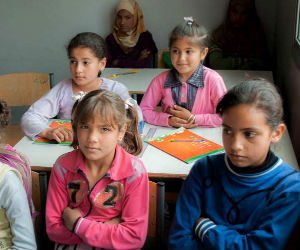
LOS ANGELES, CA (Catholic Online) - "Lebanon has opened its borders, opened its arms, and the international community owes it to Lebanon to do everything it can to help Lebanese society adapt to this," UNICEF chief Anthony Lake says. Lake had just returned from a visit to a camp in the eastern Bekaa Valley, about two miles from the Syrian frontier.
Lake says that international donors must do more to help Lebanon absorb a flood of refugees straining its schools and public services. Lebanon has an already weak government and threadbare national services that began long before before the Syrian crisis erupted two and a half years ago. Lebanon is now struggling mightily to support Syrian refugees, scattered in informal camps across the country's most deprived areas. According to the United Nations, 800,000 Syrians have either registered or are awaiting registration as refugees in Lebanon. Many more are estimated to be unregistered. Some Lebanese officials say there could be more than one million refugees in the country.
The World Bank has estimated the cost to Lebanon at around $2.6 billion over three years. Government-funded schools, which cater for the poorest third of the population, face being overwhelmed with Syrian children, even if only a fraction of these kids enroll.
At one Bekaa Valley school, 200 of the 355 children are Syrian. The kindergarten section has swollen to around 40 per class.
"Physically we are able to absorb them but at some stage we will need more teachers and equipment," head teacher Jhonny Abu Toumah said. "What else can I do with the children - put them out on the street?"
Most Syrian refugee children are being taught in refugee camps.
"(The scale) is huge and there are 400,000 children from Syria now in Lebanon - next year it could grow to double that," Lake said.
"This is going to be a huge burden on the Lebanese school system ... There are as many Syrians of school age as there are children now in the Lebanese public schools."